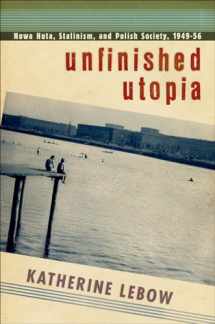
Unfinished Utopia: Nowa Huta, Stalinism, and Polish Society, 1949–56
ISBN-13:
9781501704383
ISBN-10:
1501704389
Edition:
Reprint
Author:
Katherine A. Lebow
Publication date:
2016
Publisher:
Cornell University Press
Format:
Paperback
256 pages
Category:
European History
FREE US shipping
Book details
ISBN-13:
9781501704383
ISBN-10:
1501704389
Edition:
Reprint
Author:
Katherine A. Lebow
Publication date:
2016
Publisher:
Cornell University Press
Format:
Paperback
256 pages
Category:
European History
Summary
Unfinished Utopia: Nowa Huta, Stalinism, and Polish Society, 1949–56 (ISBN-13: 9781501704383 and ISBN-10: 1501704389), written by authors
Katherine A. Lebow, was published by Cornell University Press in 2016.
With an overall rating of 4.4 stars, it's a notable title among other
European History
books. You can easily purchase or rent Unfinished Utopia: Nowa Huta, Stalinism, and Polish Society, 1949–56 (Paperback) from BooksRun,
along with many other new and used
European History
books
and textbooks.
And, if you're looking to sell your copy, our current buyback offer is $1.49.
Description
Unfinished Utopia is a social and cultural history of Nowa Huta, dubbed Poland’s "first socialist city" by Communist propaganda of the 1950s. Work began on the new town, located on the banks of the Vistula River just a few miles from the historic city of Kraków, in 1949. By contrast to its older neighbor, Nowa Huta was intended to model a new kind of socialist modernity and to be peopled with "new men," themselves both the builders and the beneficiaries of this project of socialist construction. Nowa Huta was the largest and politically most significant of the socialist cities built in East Central Europe after World War II; home to the massive Lenin Steelworks, it epitomized the Stalinist program of forced industrialization that opened the cities to rural migrants and sought fundamentally to transform the structures of Polish society. Focusing on Nowa Huta’s construction and steel workers, youth brigade volunteers, housewives, activists, and architects, Katherine Lebow explores their various encounters with the ideology and practice of Stalinist mobilization by seeking out their voices in memoirs, oral history interviews, and archival records, juxtaposing these against both the official and unofficial transcripts of Stalinism. Far from the gray and regimented landscape we imagine Stalinism to have been, the fledgling city was a colorful and anarchic place where the formerly disenfranchised (peasants, youth, women) hastened to assert their leading role in "building socialism"―but rarely in ways that authorities had anticipated.


We would LOVE it if you could help us and other readers by reviewing the book
Book review

Congratulations! We have received your book review.
{user}
{createdAt}
by {truncated_author}


